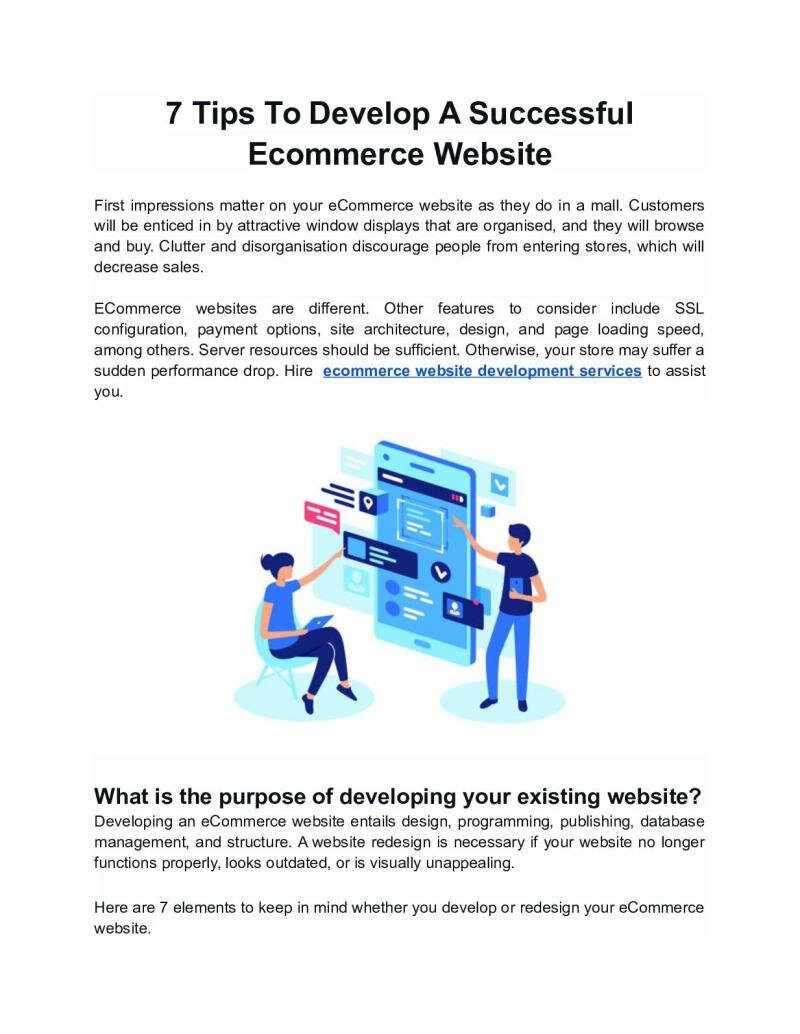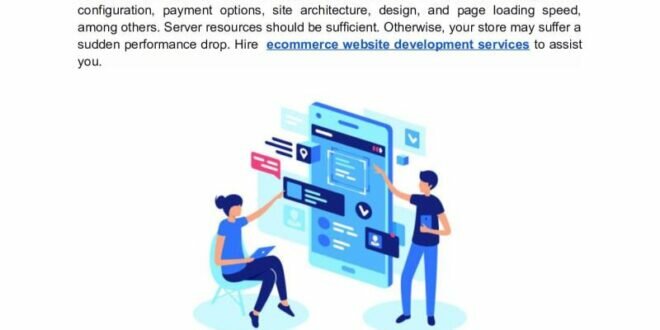
How To Build A Successful Ecommerce Website – The Internet affects all areas of our lives. We use it for socializing, entertainment, work and research. We also use it for shopping.
Now there is a generation of adults who only know the world where the Internet exists, and as they and future generations spend more money, e-commerce will grow. Currently, 43% of shoppers use the Internet and social media to research products before purchasing, and by 2024, e-commerce revenue in the US will reach $476 billion.
How To Build A Successful Ecommerce Website

Retailers cannot go offline if they want to connect with consumers. E-commerce sites give businesses the opportunity to reach new markets and gain resilience in sales if their stores have to close. If you’re just starting out, an e-commerce website can provide you with a global market and brand recognition before you open a brick-and-mortar store.
How To Start An Ecommerce Business In India 2022?
By building a dedicated e-commerce website, you can control every aspect of the customer experience, from branding to shipping to customer service. You can create it yourself or contact a developer, but either way, knowing the process will help you make an informed choice to get a website that is optimized for selling your products.
E-commerce is growing every day and offers businesses unique opportunities to connect with their target audience. A well-designed e-commerce store can provide customers with a user-friendly shopping experience.
Online sales are expected to reach 22% of global retail sales by 2023, up from 14.1% in 2019.
While some of this growth is due to the creation of more and more e-commerce sites, most of it is due to changing shopping trends. Business owners can take advantage of this global phenomenon by offering customers the option to buy after they’ve decided on a product and by reaching overseas customers with international websites and shipping.
Examples Of Successful Ecommerce Product Pages
About 11.5% of sales in the first quarter of 2020 were e-commerce sales. The impact of Covid-19 means more people are shopping online and e-commerce sales have continued to grow throughout the year. As more and more consumers shop online, business owners have the opportunity to demonstrate that the best e-commerce sites offer excellent online service, increasing loyalty in a post-Covid-19 world.
It goes without saying that the growth of e-commerce brings many benefits to a company’s bottom line, but there are more reasons to start an e-commerce business. An online presence gives businesses many opportunities to make connections that increase growth.
For many businesses, especially small businesses and startups, it can be difficult to reach customers in new markets with just a storefront. An e-commerce site allows you to reach new customers online that you cannot reach through traditional sales alone.

Online businesses can also directly impact the customer journey by creating a unique shopping experience through videos, stories and personalized services. These sales appointments don’t have to end at checkout, as you can reach customers through email marketing or social media. This extraordinary experience can convince consumers that online shopping offers comprehensive options that a brick-and-mortar store typically does not.
Build A Successful Ecommerce Website With These Helpful And Amazing Tips
If you’re selling on an online marketplace like eBay or Amazon, your products are listed generically and market brands are often used. Some customers may not even know they are buying from you, and therefore may not learn about your brand. Creating your own e-commerce website gives you control over the presentation of your products. Your customers remember you, not the market.
Creating an e-commerce website is easier than you think. There are now e-commerce solutions that do most of the work for you, but you still need to understand what’s on offer and what your website needs. If you do enough research, you can make decisions that lead to a great website that grows and evolves with you over the years.
Finding the right eCommerce website builder is the first step in your journey. It is important that it meets the requirements of your product and brand.
There are three main types of e-commerce platforms to choose from that suit different types of businesses and have different functionality. Here’s what you need to know:
The 11 Best Ecommerce Website Builders In 2022
As the name suggests, open source platforms freely offer their source code to anyone who wants to use it. It’s free to install and infinitely customizable. However, open source platforms generally require advanced coding knowledge to use them properly. Security breaches are also a concern, and users often have to hire people to maintain security, which can cost more than subscribing to other types of platforms.
SaaS, or software as a service, is an e-commerce platform offered as a subscription service. These systems are generally easy to use, scalable and have strong security. Because they are specifically designed for e-commerce, they can handle logistical processes such as checkout and payment processing.
Pricing is concerned with SaaS, monthly subscription fees, transaction fees, and add-on app costs. Some services may also have limited branding, limiting your creativity when designing. For example, websites built with Wix have a “Featured by Wix” at the bottom of the screen, so you’re not only promoting your brand, but also sharing the spotlight with Wix. Premium services typically give you more freedom to create a look and feel that reflects your brand.

Headless Commerce separates the display layer of shopping carts and e-commerce sites. This means you can use a content management system (CMS), digital experience platform (DXP), progressive web app (PWA), or other technology with a front-end and back-end e-commerce engine.
How To Start A Successful Ecommerce Business In 2020
Endless commerce enables rapid changes in customer interactions and gives companies a wide range of creative control. It also allows companies to go to market faster with a lower total cost, and companies gain more control over their store when outsourcing security and PCI compliance.
E-commerce web hosting is all about storing your data. This can affect safety and cost, so take the time to understand your options.
Cloud hosting refers to e-commerce websites that are hosted externally. This is usually offered by SaaS or headless merchant companies. The platform manages updates as well as updates, patches, and updates that help keep websites safe. Open source solutions may also have a cloud option that includes hosting costs, but security will still need to be maintained by the vendor.
On-premises hosting refers to e-commerce websites that are hosted on company servers and are usually found with open source solutions. A company must own server space, install it, and hire people to take care of it in order to keep the site running and secure. This is usually more profitable for large corporations.
Ecommerce Strategies To Reach More Customers [infographic]
Multiple systems must work seamlessly to provide customers with the best e-commerce experience. Look at how your chosen e-commerce platform is performing in the following areas to ensure it performs optimally now and in the future.
Make sure the platform works consistently and has strong uptime so your site is available when customers want to shop. Unlimited API calls help you manage your site more easily, and pages that load quickly give you the best experience for your users.
Can the platform meet your current traffic needs? Does it have the ability to grow with you as your business expands? Does it handle big days like Black Friday and Cyber Monday?

More customers are shopping on mobile devices, so it’s important that your platform can optimize your site for great mobile. Look for ways to improve the customer experience by using mobile technology, such as geolocation, to help customers find the nearest store.
How To Build A (successful) Ecommerce Website (2022)
The platform must be able to protect your and your user’s data. SaaS solutions include security such as SSL and PCI as part of their monthly plans. Self-hosted and open source solutions require more security awareness due to the greater possibility of attack.
Your website builder is the foundation of your online store. Options built specifically for e-commerce give you more options and room for growth than generic website builders with an e-commerce plugin. Here are some things to consider:
Is a SaaS solution known as scalable. It has 24/7 customer support with priority support for large accounts. There are many built-in features. Multi-layered security keeps data safe and local payment methods attract users from around the world. Supports headless, so brands can deliver an API-based experience through a CMS, DXP, app, device or custom front-end – powered by a commercial engine.
Shopify is another SaaS solution that is fully hosted and known to be quick and easy to set up. They have a wide selection of modules, but if you need to use a lot, the price can add up quickly. Shopify can handle a large number of transactions per minute, so it can easily handle traffic spikes.
How To Build A Successful Ecommerce Website
Magento is a self-hosted solution, so you have complete creative freedom; However, you need someone with coding knowledge to take full advantage of the platform. It has a wide range of integrations and can handle instant purchases and product recommendations.
WooCommerce is an open source WordPress plugin, so
How to build a wordpress ecommerce website, how to build a successful ecommerce website, how to build an ecommerce website, how to build ecommerce website using shopify, how to build your own ecommerce website, how to build a free ecommerce website, how to build a successful ecommerce business, how to build my own ecommerce website, how to build a ecommerce website, how to build ecommerce, how to build ecommerce website, how to build ecommerce website with wordpress
 GoInspiration | Best Forex, Stock, Gadget, and Internet Information Apps
GoInspiration | Best Forex, Stock, Gadget, and Internet Information Apps